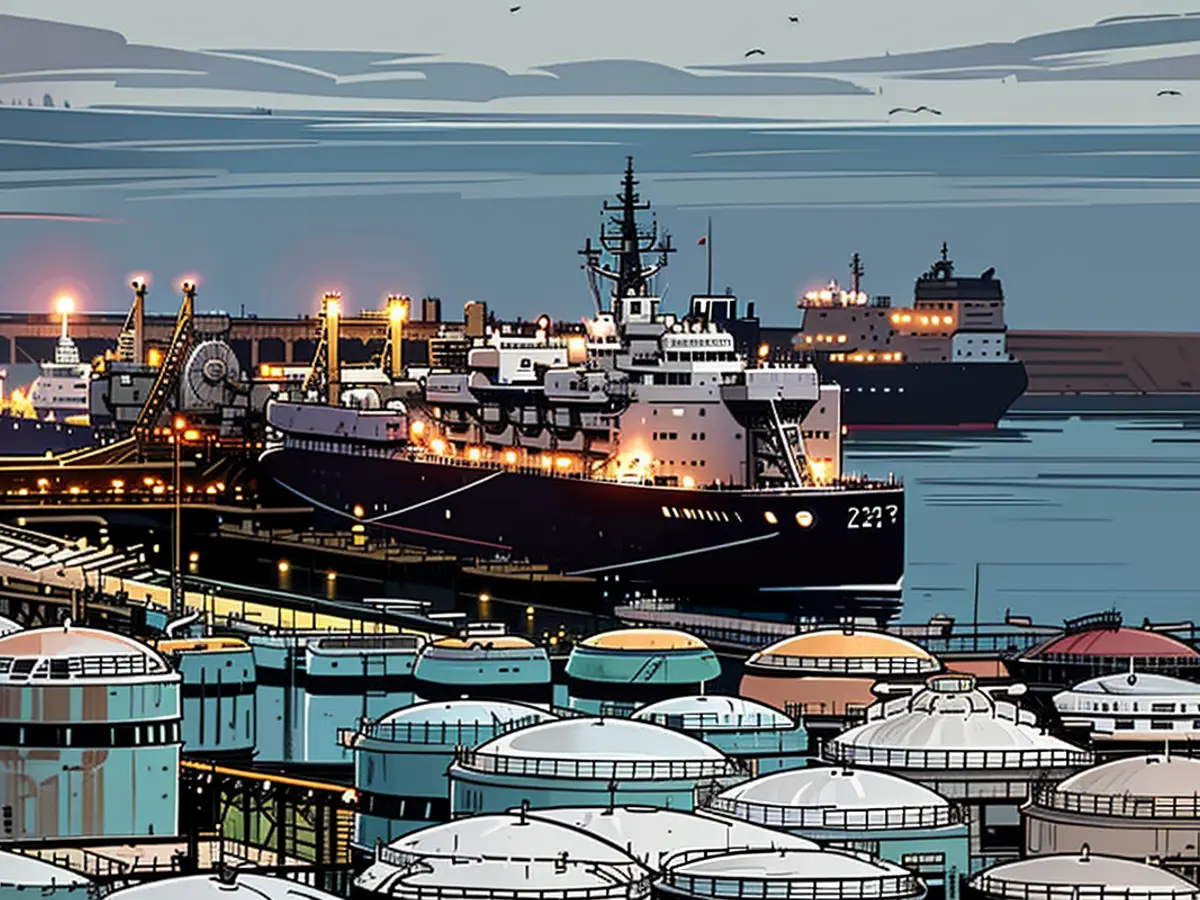Impacts of Initial Gas Sanctions on Putin's Financial War Reserves
The European Union has imposed restrictions on the export of Russian Liquefied Natural Gas (LNG) from European ports for the first time. The import of Russian LNG into EU countries remains untouched. The new sanctions only apply during the transshipment of Russian LNG at European ports for the global market.
Russia's gas trade with the European Union is thriving, with no sanctions against the import of pipeline or LNG gas from Russia so far. This benefits the Kremlin as it allows for unhindered supply to EU member states and profits from the advantageous location of European ports, serving as a transshipment hub for Russian LNG in the Asian-Pacific region. The EU aims to prevent this re-export with their planned 14th sanctions package.
Russia is the second-largest supplier of LNG to the European Union, after the USA. In May of this year, Moscow shipped over 1.9 million cubic meters of Russian LNG to the EU, while the USA shipped approximately 4.3 million cubic meters.
Since the invasion in Ukraine in 2021, the EU has imported less gas from Russia via pipelines but more Russian LNG. According to a study by the climate protection organization Research on Energy and Clean Air (CREA), the EU imported at least 20 billion cubic meters of Russian LNG in 2023, with nearly a quarter of this being transshipped and exported to countries like China from Belgian, Spanish, and French ports. The new sanctions package targets these transshipment points.
Professor Michael Rochlitz of St. Antony's College, Oxford University, considers the sanctions as insignificant. The Kremlin's economy is currently doing well due to heavy investments in the war economy, financed through reserves accumulated before 2022, the export of gas and oil to India and China, and soon through stronger taxation of Russian companies. The Kremlin's priority remains the advancement of the invasion in Ukraine.
Despite the sanctions, the LNG export to the European Union remains a revenue source for Moscow, with the EU being the largest customer and paying over eight billion Euros for it in the previous year. European companies also earn money from the re-export. The gas reaches the ports through transshipment and also Germany, but in small quantities. Experts and environmentalists estimate that the share of Russian LNG in Germany's gas supply ranges from the medium single-digit to low double-digit percentage.
Energy expert Szymon Kardas of the European Council on Foreign Relations doubts that the planned EU sanctions will create large holes in Putin's war chest. The share of LNG in Russia's total energy exports is too small, according to Kardas, making up only about 15 percent of Russia's energy exports. Initially, Russia had ambitious plans for LNG production and export, aiming to reach a production capacity of 140 million tonnes by 2025. However, these plans have been dashed due to the effects of sanctions imposed by the EU and the US several years ago. These sanctions have nothing to do with the current one that European leaders are planning to approve.
Instead, the sanctions target high-performance technologies, which were imposed on Russia shortly after the start of the Russian aggression war. Russia is particularly suffering from this in LNG transport, as it lacks the technical know-how for the development of its fleet. For example, it can no longer produce icebreakers, which are necessary for the passage through arctic waters to LNG terminals in Siberia.
The Arctic LNG 2 project of the Russian company Novatek in North Siberia on the Gydan Peninsula is particularly affected by the sanctions. The first production line of the plant, completed in 2023, was supposed to export 6.6 million tonnes of LNG per year. However, nothing from Arctic LNG 2 could yet be shipped due to the lack of high-performance technology. Russia has therefore been unable to fulfill some gas supply contracts it has concluded, for example with France.
Read also:
- The EU sanctions prohibit the transshipment of Russian Liquefied Natural Gas (LNG) at European ports for global market re-export, aiming to limit Russia's profits from gas supplies.
- Despite the EU restrictions, Vladimir Putin's government continues to earn revenue from LNG exports to the EU, making Europe the largest customer for Russian LNG, with payments exceeding eight billion Euros in the previous year.
- The new EU sanctions package targets the transshipment points of Russian LNG, aiming to prevent re-export to countries like China from Belgian, Spanish, and French ports.
- The ongoing sanctions impact Russia's ability to advance its high-tech LNG transport, specifically in the development of icebreakers required for Arctic LNG 2 project in North Siberia, delaying the expansion of LNG exports.








